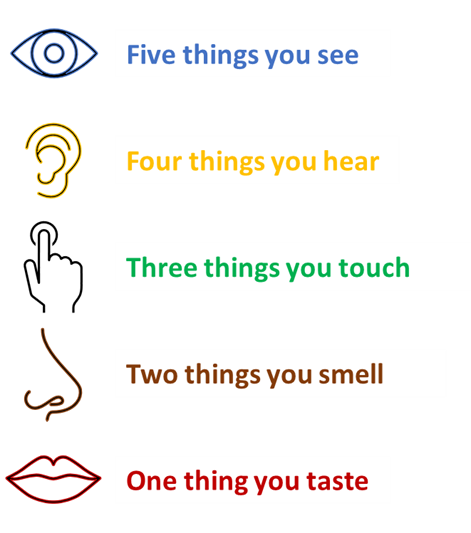|
I have found grounding exercises really useful when I've been upset, anxious, having flashbacks, or have thoughts spinning uncontrollably around my head. Sometimes just saying to myself 'I am Suzanne, and I am here in my living room' helps. Sometimes I need a bit more than that though. Different grounding techniques (and there are a lot of them) help different people – here are some that have worked for me and for people I know. Five things One of my sisters came to be with me in the early days after Tim's death, and saw that I was getting stuck in a whirling loop of thoughts. She taught me the 'five things' grounding technique – think of five things you can see, four things you can hear, three things you can touch, two things you can smell, one thing you can taste. A few months after Tim's death I went to report on a conference (I'm a medical writer), and a man near me had a cold. His breathing rattled and it dragged me right back to the moment where Tim's last breath woke me on that awful Saturday morning. I could feel myself heading into an anxiety attack and running through the five things two or three times really helped me. Number and letter sequences
Sequences of numbers or letters can help to control anxiety.
Describing things Looking at a photo, advert, newspaper front page or a scene and describing it to yourself as if it was to another person is another way to distract yourself: "There are two sparrows on the path. They are pecking at some seeds. Their feathers are buff and chestnut and grey. The cup of tea in my hands is warm, it makes a sound in my mouth like the A below middle C. There are people talking at the next table. I can't hear what they are saying but they look happy. The woman is wearing a brown coat and has curly white hair." Smells and tastes A friend and fellow widow carries cinnamon oil in her handbag. It's a smell that is strong and comforting, but that carries no specific memories or bad associations. When she feels stressed or anxious, she smells the oil, and it helps to ground her, and pull her back into 'now'. Eating something spicy or sour can work in a similar way, as can a familiar and well-loved scent. Objects Another friend and fellow widow has a pebble that fits perfectly into the palm of her hand. When she is feeling calm, connected and grounded, she holds the pebble in her hand and luxuriates in how she is feeling. When she feels disconnected or dissociated, she holds the pebble and it anchors her back to feeling safe. Sounds and images
Trigger differentiators Trigger differentiators bring us back into the 'here & now', and away from what happened 'then & there', and can really help with flashbacks and triggers, and diffuses the mental, emotional and physical response.
Breathing Slow breathing can help us to control emotions. There are a whole host of different techniques – find the one that work best for you, and repeat as often as you need to.
0 Comments
Leave a Reply. |
AuthorI was widowed at 50 when Tim, who I expected would be my happy-ever-after following a marriage break-up, died suddenly from heart failure linked to his type 2 diabetes. Though we'd known each other since our early 20s, we'd been married less than ten years. Archives
July 2024
Categories
All
|



 RSS Feed
RSS Feed